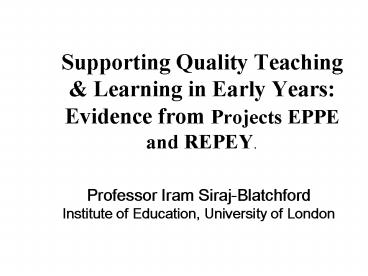Supporting Quality Teaching PowerPoint PPT Presentation
1 / 23
Title: Supporting Quality Teaching
1
Supporting Quality Teaching Learning in Early
Years Evidence from Projects EPPE and REPEY.
- Professor Iram Siraj-Blatchford
- Institute of Education, University of London
2
Effective Provision of Pre-School EducationE P P
E (UK)
- Iram Siraj-Blatchford Institute of Education,
University of London - Kathy Sylva University of Oxford
- Edward Melhuish Birkbeck, University of London
- Pam Sammons Institute of Education, University of
London - Brenda Taggart Institute of Education, University
of London
3
Aims of the EPPE research
- To establish the impact of pre-school on young
childrens intellectual and social/behavioural
development. - To identify those pre-schools that are more
effective than others in promoting childrens
development. - To describe the characteristics of effective
pre-school settings. - To establish the impact of the home and childcare
history (before age 3) on childrens intellectual
and behavioural development. - To explore whether pre-school experience can
reduce social inequalities.
4
Sample
- Six local authorities
- Pre-school centres randomly selected within the
authorities to include - playgroups
- nursery classes
- private day nurseries
- day care centres run by local authorities
- nursery schools
- fully integrated centres
- A home sample approx 300 who have no group
pre-school experience - Approx 3000 children and 141 centres
5
Sources of data
- Child assessments over 4 years e.g. cognitive
tasks and social-emotional profile - Interviews e.g. with parents and heads of
centres, and local authority officers - Systematic rating of quality in centres
- Documents e.g. curriculum statements, policy
documents etc. - Qualitative case studies of centres
6
Plan of Study an educational effectiveness
design
Reception Year 1
Year 2 (5 yrs) (6 yrs)
(7 yrs)
Pre-school Provision (3yrs)
Baseline Assessment N 3,000 Exit Assessments
N 1500 Age 6 Assessments N 3,000 Age 7
Assessments N 3,000
25 nursery classes 590
children
34 playgroups 610 children
31 private day nurseries
520 children
20 nursery schools 520
children
24 local authority day care nurseries
430 children
7 integrated centres 190
children
home 310 children
7
Main Findings
- Pre-school experience, compared to none, enhances
intellectual and social development in all
children. - Good quality pre-school experiences support
better cognitive and social-behavioural
development for children. - Good quality can be found across all types of
early years settings, but the state sector has
more good quality. - For all children learning at home helps cognitive
and social development. - Disadvantaged children in particular can benefit
significantly from good quality pre-school
experiences.
8
Quality
- Good quality and better cognitive outcomes for
children are associated with higher
qualifications in staff- especially trained
teachers
9
Home learning before 3 years
What parents and carers do is most important and
makes a real difference to development.
Activities for parents which help childrens
development include
- reading to children
- teaching children songs and nursery rhymes
- playing with letters and numbers
- painting and drawing
- taking children to libraries
- (for social outcomes) creating regular
opportunities for play with friends.
10
REPEY Case Studies
- The most effective settings provide both
teacher-initiated group work and freely chosen
yet potentially instructive play activities - Excellent settings tend to achieve an equal
balance between adult-led and child-initiated
interactions and activities - Siraj-Blatchford et al (2002) Researching
Effective - Pedagogy in the Early Years (REPEY), DfES
11
REPEY Case Studies
- Cognitive outcomes relate to teacher/adult
planned and initiated focused group work and the
amount of sustained shared thinking between
adults and children - Effective pedagogy is both teaching, and the
provision of instructive learning environments
and routines - Siraj-Blatchford et al (2002) Researching
Effective - Pedagogy in the Early Years (REPEY), DfES
12
Effective Pedagogy in the Early Years
Sustained shared thinking An episode in which
two or more individuals work together in an
intellectual way to solve a problem, clarify a
concept, evaluate activities, extend a narrative
etc. Both parties must contribute to the
thinking and it must develop and extend.
Siraj-Blatchford et al (2002) Researching
Effective Pedagogy in the Early Years (REPEY),
DfES
13
Percentage of pedagogical interactions (cognitive
and monitoring) in settings varying in
effectiveness
14
Percentage of high cognitive challenge activities
within each initiation category in each setting
type
15
Figure 26a Curricular areas (proportionally) in
which children use computers
16
Figure 27 Adult/Teacher presence at the computer
17
Figure 28a Cognitive pedagogical interactions
which occurred while children were engaged in
computing activities
18
Figure 29 Social pedagogical interactions when
children are engaged in computing
19
? Children use computers primarily without an
adult present. ? When practitioners are
present they are more likely to be fully
qualified teachers. ? Children are encouraged
to discover for themselves, while the adult
provides encouragement, questions and management
if appropriate.
20
The role of the teacher Enquiry Questions 3
Questions can often be started with I
wonderwhat, if, why, how, when, where
Information and Communication Technology
21
The role of the teacher Enquiry Questions 7
Positive questioning
I dont know, what do you think? Thats an
interesting idea. I like what you have done
therewhat Have you seen what X has donewhy I
wondered why you had Ive never thought about
that before Youve really made me think What
would happen if we did
22
The role of the teacher Enquiry Questions 8
Making sense words
I think I agree I imagine I disagree I
like I dont like I wonder
23
For further information about EPPE visit the EPPE
website at http//www.ioe.ac.uk/cdl/eppe/
Also at http//www.dfes.gov.uk/research/data/upl
oadfiles/RR356.pdf http//www.parliament.the-stati
onery- office.co.uk/pa/cm199900/cmselect/cmeduemp
/3860062101.htm

